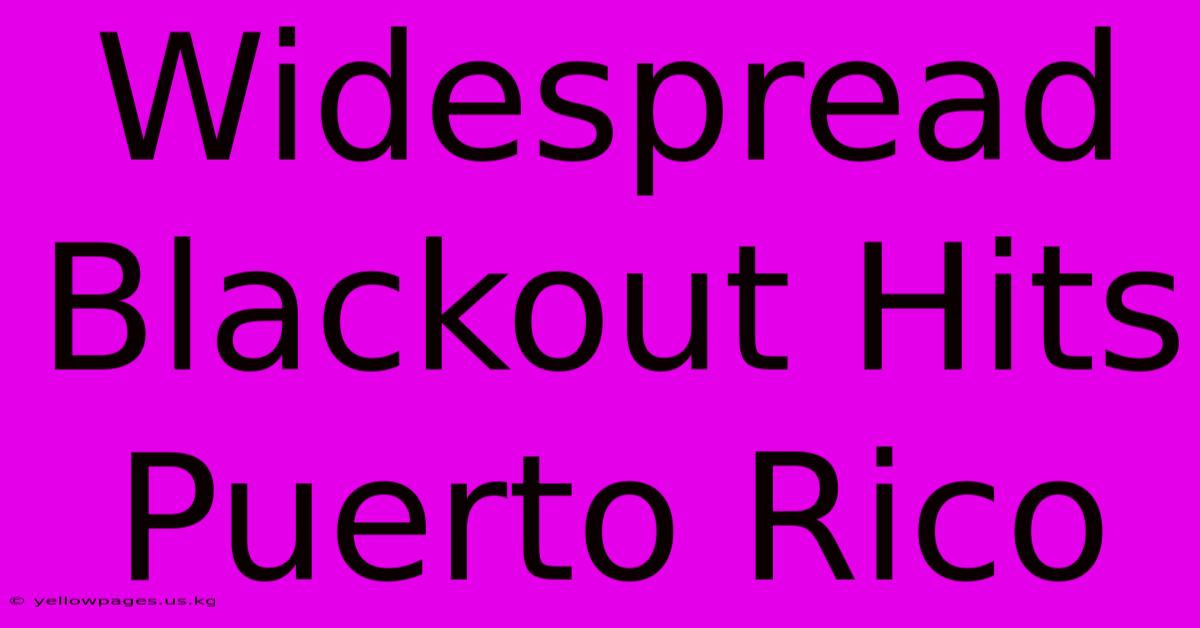Widespread Blackout Hits Puerto Rico

Discover more detailed and exciting information on our website. Click the link below to start your adventure: Visit Best Website trendingnews.us.kg. Don't miss out!
Table of Contents
Widespread Blackout Hits Puerto Rico: Assessing the Impact and Looking Ahead
Puerto Rico, an island already grappling with infrastructural challenges, recently experienced a widespread blackout impacting its entire power grid. This event underscores the fragility of the island's energy system and highlights the urgent need for long-term solutions. This article delves into the causes, consequences, and potential pathways to a more resilient energy future for Puerto Rico.
Understanding the Blackout's Causes
While the precise cause of the recent blackout is still under investigation, several contributing factors are likely at play. These include:
-
Aging Infrastructure: Puerto Rico's power grid is aging and in desperate need of modernization. Years of neglect and insufficient investment have left the system vulnerable to disruptions. This is a chronic problem, not a new one, and contributes significantly to the frequency of outages.
-
Maintenance Issues: Lack of proper and consistent maintenance further exacerbates the weaknesses of the aging infrastructure. Deferred maintenance increases the likelihood of equipment failures and cascading outages.
-
Natural Disasters: Puerto Rico is situated in a hurricane-prone region. Past hurricanes have inflicted significant damage to the power grid, compounding existing problems. While this particular blackout wasn't directly caused by a hurricane, the vulnerability left by past storms significantly contributes to the risk.
-
Potential Grid Overload: Increased energy demand, particularly during peak hours, might have stressed an already weakened grid, leading to a system-wide failure. This stresses the urgency of developing more robust and adaptable infrastructure.
The Ripple Effect: Consequences of the Blackout
The widespread blackout had far-reaching consequences across the island:
-
Economic Disruptions: Businesses suffered losses due to closures and operational disruptions. This particularly impacts small businesses which lack the resources to recover quickly from extended outages.
-
Healthcare Challenges: Hospitals and medical facilities experienced disruptions, impacting patient care. The reliance on electricity for medical equipment underscores the need for backup power solutions.
-
Social Disruptions: Daily life was severely affected, with residents facing challenges accessing essential services like water, communication, and transportation. This emphasizes the critical need for reliable infrastructure.
-
Water Supply Issues: Many water treatment plants rely on electricity, leading to disruptions in water supply and potential sanitation issues.
-
Food Spoilage: Lack of refrigeration led to significant food spoilage, especially for those without backup power sources.
The Path Forward: Building a Resilient Energy Future
Addressing Puerto Rico's energy challenges requires a multifaceted approach:
-
Investing in Modernization: Significant investment is needed to modernize the power grid, utilizing advanced technologies and resilient designs. This needs to be a long-term commitment, not a short-term fix.
-
Improving Maintenance: Regular and preventative maintenance is crucial to preventing future outages. This requires a skilled workforce and consistent funding.
-
Diversifying Energy Sources: Exploring and implementing renewable energy sources, such as solar and wind power, can enhance grid resilience and reduce dependence on fossil fuels.
-
Strengthening Emergency Response: Improving emergency preparedness and response mechanisms is critical for minimizing the impact of future outages.
-
Community Engagement: Involving communities in the planning and implementation of energy solutions fosters ownership and increases the likelihood of success.
The recent widespread blackout serves as a stark reminder of the vulnerabilities facing Puerto Rico's energy system. Addressing these challenges requires a collaborative effort involving government agencies, private sector partners, and the community itself. Only through sustained investment, strategic planning, and innovative solutions can Puerto Rico achieve a more reliable and resilient energy future. The island deserves an energy grid that can withstand future challenges and support its economic and social development.

Thank you for visiting our website wich cover about Widespread Blackout Hits Puerto Rico. We hope the information provided has been useful to you. Feel free to contact us if you have any questions or need further assistance. See you next time and dont miss to bookmark.
Featured Posts
-
Alabama Vs Michigan Milroes Impact
Jan 01, 2025
-
Central Ny Lake Effect Snow Warning
Jan 01, 2025
-
Msu And Wisconsin Earn Three Stars
Jan 01, 2025
-
Debrina Identified In Fatal Subway Fire
Jan 01, 2025
-
Cfp Top Teams Preview Next Season
Jan 01, 2025
